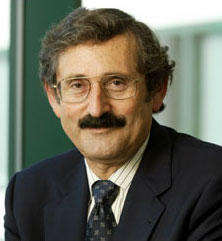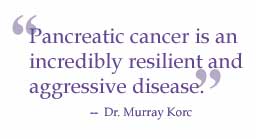|
|
For Release: June 9, 2005
Contact: MedNews Office (603) 650-1492
New Advances May Slow Tumor Growth in Pancreatic Cancer
Dartmouth Researchers Find Protein Responsible for Unchecked Cell Growth

Dr. Murray Korc
HANOVER, NH - Making new strides in their ongoing effort to understand mechanisms behind the relentless growth of cancer cells, researchers at Dartmouth Medical School have found a promising key that may open doors to future treatments in pancreatic and other forms of cancer. The innovation lies in manipulating an overabundance of chemo-resistant molecules in pancreatic cancer that inactivate pathways that would normally suppress cell growth.
Published in the June 10 issue of the Journal of Biological Chemistry, the study was led by Dr. Murray Korc, a pioneer in early research on growth factor receptors in pancreatic cancer, and chair of the department of medicine at Dartmouth Medical School (DMS) and Dartmouth-Hitchcock Medical Center, and a member of the Norris Cotton Cancer Center. His team's research has focused on suppressing pancreatic tumor growth by determining the mechanisms that enable the cells to grow so quickly.
"Pancreatic cancer is an incredibly resilient and aggressive disease," said Korc. "It grows quickly without causing symptoms, is resistant to chemotherapy, has a strong tendency to metastasize, and patients are often beyond surgery when it is diagnosed."
This study builds on the team's prior research on a molecule called Smad7, found in half of all human pancreatic cancers. Smad7 lies in pathways that normally play an important role in regulating cell growth and often prevents cells when proliferating too quickly. But Smad7 interferes with these pathways that are normally regulated by TFG-� molecules, so they cannot regulate the growth of cells, and these cells continue to grow unchecked until they eventually become tumors.

"Previously, we found that Smad7 blocks the ability of TFG-� to inhibit the growth of these cancer cells," said study co-author Dr. Nichole Boyer Arnold, a postdoctoral fellow at DMS and a member of the Norris Cotton Cancer Center. "In this study, we discovered that Smad7 is able to do this by suppressing the function of the retinoblastoma (RB) protein." The RB protein is crucial to empowering TFG-� to control cell growth.
DMS researchers also found that pancreatic cancer cells generate TFG-� molecules at a much faster rate than normal. "It's a devilish mechanism," explains Korc. "Smad7 not only prevents TFG-� molecules from slowing the cancer down, but enables them to multiply at a high rate, and thus gives the cancer another growth benefit. In addition, TFG-� molecules are still able to stimulate blood vessel formation and enhance the growth of adjoining cells, which further increases the cancer's ability to metastasize."
Korc likens the process to a scorpion that not only has a newfound immunity to his own poison, but every time he stings himself, he gets bigger and more powerful.
"Now that we know how Smad7 is able to inactivate TFG-� growth suppressive effects by preventing RB from functioning properly, we can focus our research on the RB protein," said Korc. They hope to find a way to disrupt Smad7's ability to affect the RB protein in human pancreatic cancers. Of the 31,000 people in the US that get pancreatic cancer this year, 30,300 will die from it, according to Korc, and most patients die within six months, which is why these advances in new therapies are so important.
He notes that even if his lab is able to overcome these problems in RB, it will not lead to a "cure" for pancreatic cancer. Pancreatic patients are under attack from so many different directions that the answer will not lie in one particular aspect of therapy. The authors hope that their work will add to a growing arsenal of treatments that, when combined in a form of therapy individualized to each patient, will have an impact on this devastating disease.
This study was funded by the National Institutes of Health and by a postdoctoral fellowship from the George E. Hewitt Foundation for Medical Research.
-DMS-